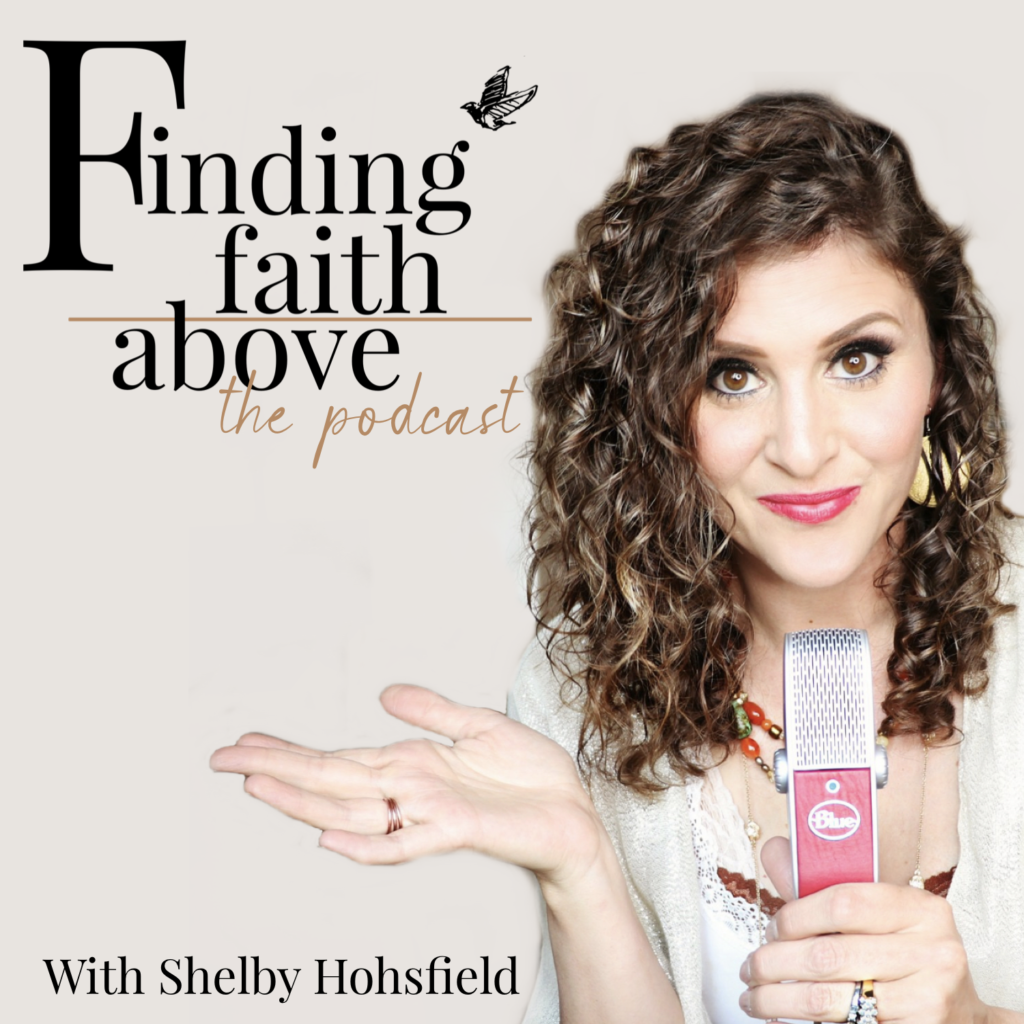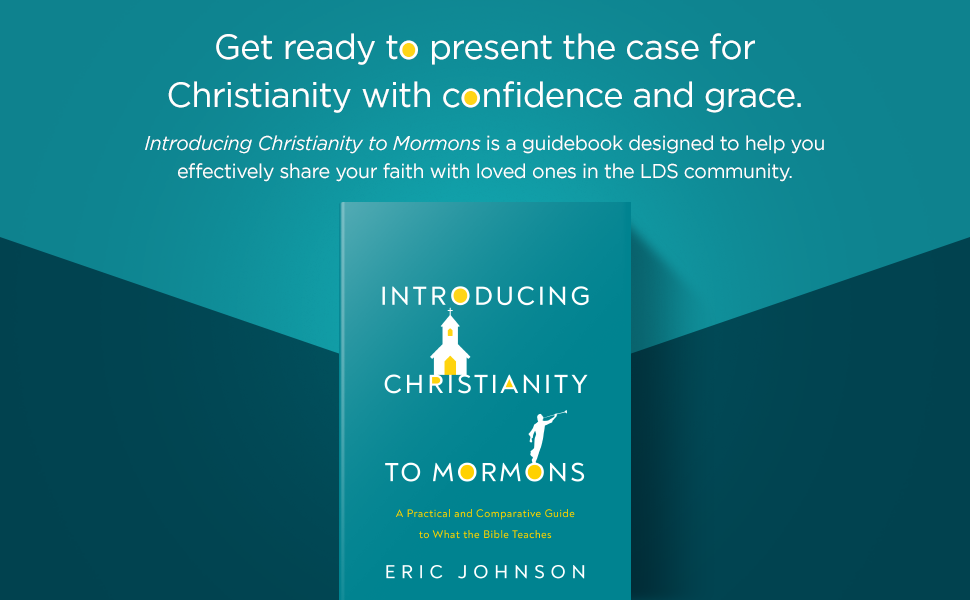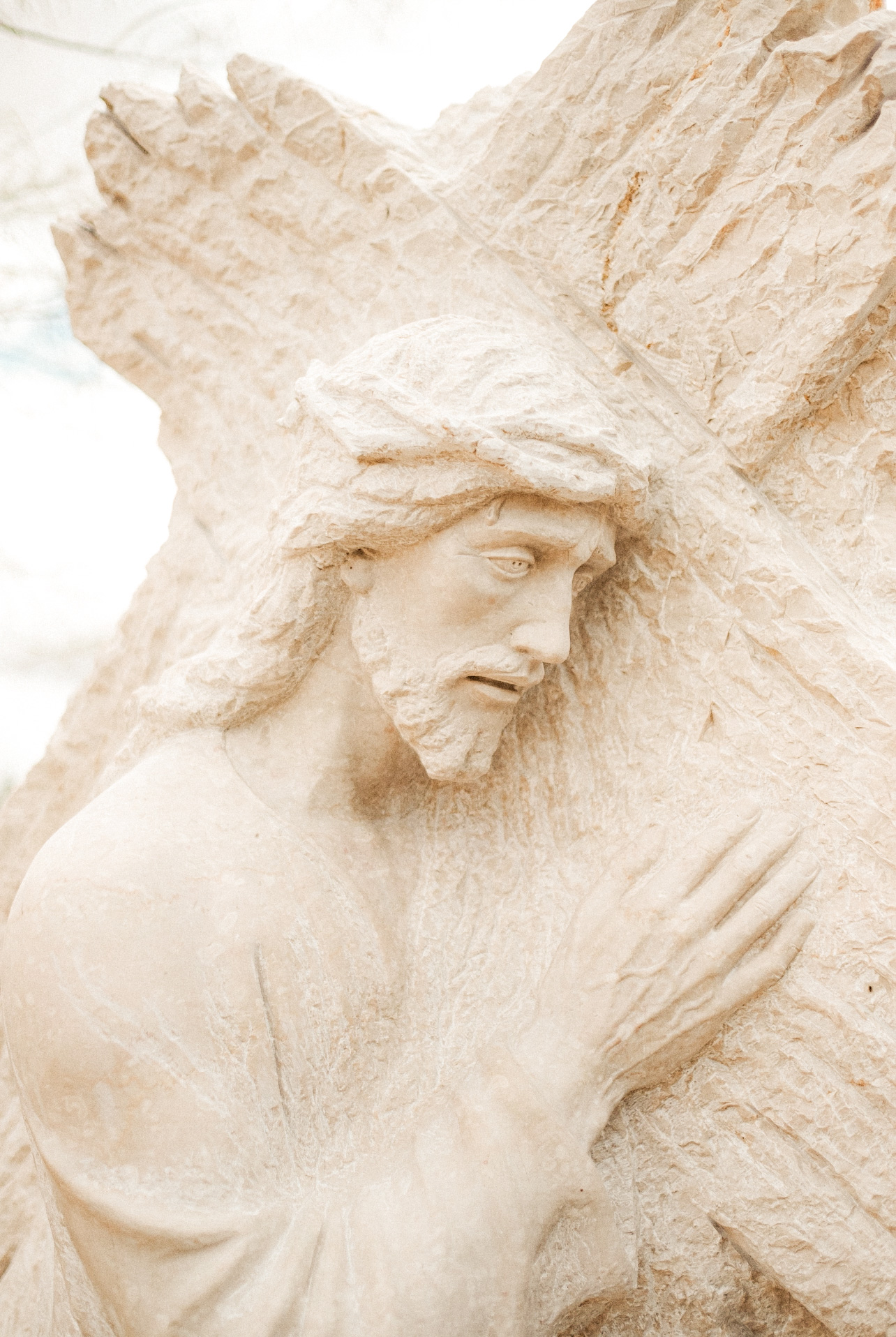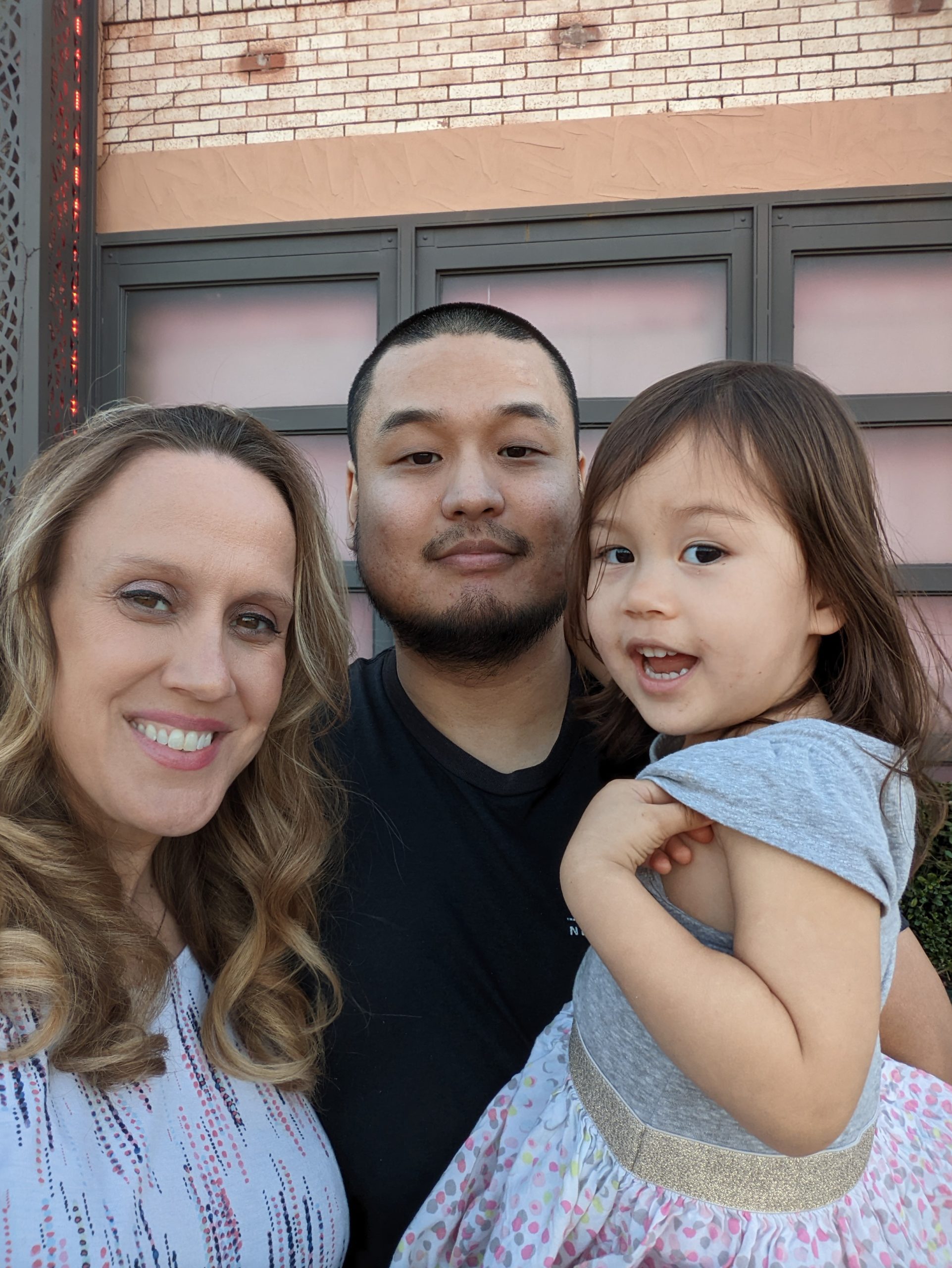June 3, 2022
Listen to the Podcast
I am so excited to start this series of the 10 Basic Christian Beliefs every exmo and new believer needs to know.
Let me tell you why.
When I first left The Church of Jesus Christ of Latter-Day Saints, the Mormon church, and was just at that place of wanting to learn what other Christian faiths were all about, I was embarrassed. I remember sitting in a Christain Mother’s of Preschoolers bible study and not even saying a word because I didn’t have any idea what they were talking about. I didn’t know what a devotional was, why crosses are okay and not wrong, and why they never talked about heavenly mother or who Paul even was. I didn’t know what books were part of the Bible and what is part of the Book of Mormon, Pearl of Great Price, or D&C. I knew I didn’t want to be Mormon, but I had no idea how to be, or what to do as a Christian. Was I even a Christian?
I wanted someone to explain things to me like I was a child. Not condescending, as an enneagram five I have serious feelings about being incapable. I just wanted the book, How to believe as a Christian 101.
I didn’t even know where to look and my fear and insecurities kept me lost for years. 20 years to be exact.
This series is all for you. You are hungry to know His peace. You want to know truth. You want to confidently show up to Bible study ready to dive in without embarrassment. You who want to know what it means to follow Christ- to know Him and to make Him known.
This is the true Gospel as I have come to learn from Him, the beautiful people He has brought into my life, books and above all the Good Book- His word, the Bible.
This series is for you.
Join the waitlist!!
Christian Beliefs 101- The 10 Christian Beliefs Every Exmo and New Believer Need to Know
The full course is coming your way! Be the first to know when seats are open HERE!
So long as it’s translated correctly.
Words we have all heard.
These words kept me from trusting the Bible for years and years, and although I hate to admit it, these words may occasionally still play tricks on me. As a natural questioner all my life…
…The Devil knows his in.
But what I can’t deny, not even for a second is the peace, the excitement, the fullness that the Bible brings me now after coming to Christ. Does it have to do with the Holy Spirit? Is that the change that made the Bible truly feel like living water to my soul when I read?
I also wonder if it is just the fact that I am getting truth from the source, something I always longed for.
But the words ‘so long as it is translated correctly’ about the Bible were something I had to dispense with if I wanted to build a relationship with the Lord after leaving the Mormon church and coming to Christ.
I had to trust that what I was reading was indeed translated correctly, was truly God’s word, and was what God intended me to hear.
Today’s Question:
What translation of the Bible should I read?
Today we are going to go over…
3 Steps to Finding the Perfect Bible Translation for YOU.
First off,
if you are questioning the reliability of the Bible in general then you need to go back 2 episodes to the beginning of the Christain Beliefs 101 series for Exmo and New Believers. In Ep 67, we break down reasons to believe in the inerrancy of the Bible. Find that here. It’s a good one.
Today, we are assuming you have some trust but are needing direction.
Here we go.
***Spoiler alert- the King James Bible was not the original Bible that all further translations translate from.
***Another Spoiler alert- the old testament was written in ancient Hebrew. Do you know what language Jesus spoke? Aramaic. That means even God on Earth, the son, Jesus Christ read translations or translated Himself from the Hebrew as many scholars believe. Think about that.
Here are our 3 steps to finding the perfect translation for you to read.
1) Get over the word translation and understand what it really means.
What most of us in the church understood as translation is actually meaning transmission.
The word translation means the process of translating words or text from one language into another.
The word transmission as it applies to the Bible is “the ancient process of copying Hebrew and Greek manuscripts to preserve them for future generation and to distribute them for greater use. Since there were no copy machines, the texts had to be copied by hand. In this way they were “transmitted.” source
Transmission is when we typically think of when we believe that the ‘translation’ was corrupted, like a bad game of telephone.
I was sold on the idea, partly through the church and partly through secular history class, that corrupt individuals held onto the Bible when they were in power. Let’s say 50 years. During that time they were the only ones in control of it. They corrupted it as they saw fit to suit their needs because like it or not even they recognized the Bible has power. At the end of their rein, they passed it down, and then further changes were made. And so on and so on.
The problem with this transmission theory is the evidence does not hold up.
Here are some basic facts.
The Bible contains 66 books by over 40 different authors in 3 languages over the course of 1500 years, and they all agreed and tell one unified story of sin, redemption through the Messiah, judgment, and God’s grace. At times in history, the scrolls were protected and integrity preserved to this degree-
- Synagogue scrolls had to be written on specially prepared skins of clean animals and fastened with strings taken from only clean animals. Each skin had to contain a certain number of columns. Each column had to have between 48-60 lines and be 30 letters wide. The spacing between consonants, sections, and books was precise being measured by hairs or threads. The ink was specific and had a precise recipe. The scribe had to wash their whole body before beginning and again before writing the name of God, Yahweh. The number of words were counted, syllables forward then backward. If more than two mistakes in any way were made, no revision could be made and the entire manuscript was tossed out and had to be started again. Old manuscripts were destroyed to keep from being misread.
They take this seriously.
In 1947 the biggest Biblically archeological find happened that could have ever occurred. The Dead Sea scrolls were discovered giving rise to hundreds of manuscripts dating well before the earliest manuscripts we had previously. One such complete book was Isaiah. It closed the gap between the oldest copy we had and what was found by 1000 years. Everyone expected for there to be massive differences between the two copies. It was going to prove once and for all that the transmission of the Bible had been corrupted.
It didn’t.
In fact, aside from minor alterations in spelling the two documents, from an ancient world 1000 years apart in time, were identical.
That, my friends, is God.
The original scrolls were written in Hebrew, Aramaic and Greek.
Today, the Bible has been translated into over 700 languages.
What do they use to create these translations? Those, very old, as original as possible manuscripts were written in the language they were originally written in.
Nearly all modern English translations of the Old Testament are based on a single manuscript, the Leningrad Codex also called the St. Petersburg Codex, copied in 1008 or 1009. It is a complete example of the Masoretic Text, and its published edition is used by the majority of scholars. The Aleppo Codex is the basis of the Hebrew University Bible Project in Jerusalem. Copied about 925 CE, part of it was lost, so it must rely on additional manuscripts, and as a result, the Aleppo Codex contains the most comprehensive collection of variant readings.
source
A team of very smart individuals consisting of anthropologists, theologians, linguistics experts, social and historical science geeks, and those who know more about the culture, language, and understanding than any modern human should, get together and pour over the ancient documents for literally years. That is how a reliable translation today is created. Do they sometimes disagree? Do ancient manuscripts sometimes disagree? Yes, that is why you have footers in the text of your translation to indicate where small discrepancies, called variants, lie. It is no secret, and it’s also no seer stone and a top hat.
In all, there are over 24,000 ancient manuscripts of the Bible.
2) Why is there more than one translation? Thought for Thought vs Word for Word
Now that we have established what translation means, what transmission means, and where translations come from, let’s look at some differences in translations. If this fancy team is simply translating words from one language to another why would there be differences?
Simple- culture.
Let’s use the popular saying today- ‘Get a taste of your own medicine’. Let’s say we wrote this down and it became a manuscript.
If someone 2000-3000 years from now speaking a completely different language in a completely different culture decided to translate this manuscript word for word they might think you somehow actually create medicine when in reality this simply means something you did to someone else now is happening to you. Not medicine at all.
That is what we get with the Bible translations.
We have one approach that is as word for word as possible. Will we be able to understand all the text in context? Most likely not, but maybe that is not for the translators to decide.
The other approach is thought for thought. This translates the meaning of the text. For instance, in the example above one might translate it- you get what you deserve. The true meaning is there regardless of the words.
Most translations today are a good mix.
One thing to note, if you really don’t feel like trusting these super-smart teams of Bible translating gurus, you can actually learn to read the ancient text yourself. No one is stopping you and with the internet now there is no need to fly across the world to visit the Isreal Museum in Jerusalem.
As for myself, just as God protected Isaiah I trust His word in the translations we have today.
3) What translations do we have and what should we trust?
By and large, there are a number of the most popular English translations available literally at your fingertips. With the Bible app, Blue Letter Bible, and other apps you can toggle back and forth between different translations like no one’s business. -Too easy considering what people still go through today to hold His word in their hands in parts of this world. We are so blessed.
Here is a list of some of the most popular translations on a scale from the most Word for Word to Thought for Thought.
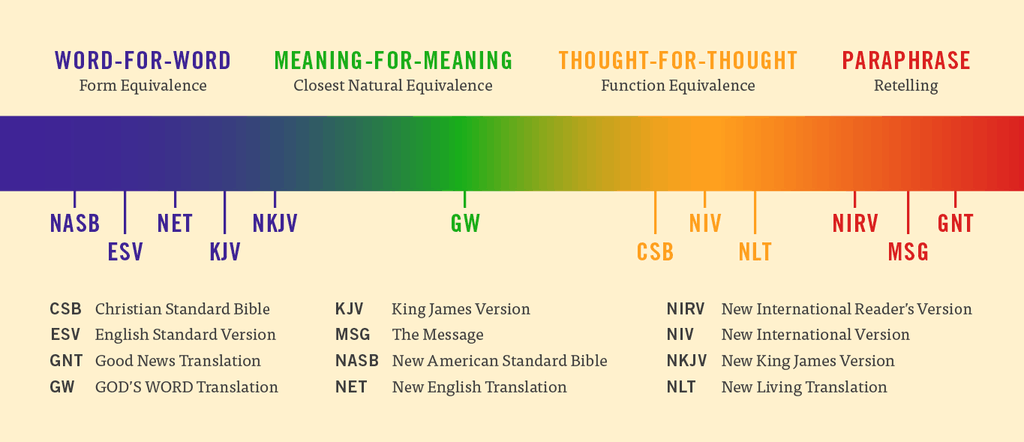
The main ones I see used today in the circles I run in are the ESV, NIV, NLT, and occasionally the MSG.
Some things to note- There are some funky translations out there- the Joseph Smith Translation, anyone?- where the approach we talked about above was not used. If you decide to venture off and use a translation outside of the popular versions do some research and make sure you are comfortable with the approach taken.
And know this, God speaks His word into all our hearts in different ways. Just because one sings to me, doesn’t mean it has to speak the same to you.
In this blog/ podcast I use mainly the ESV, NIV, and NLT, but I toggle between all of them to make sure I am understanding the passage to my fullest capability before speaking on it to you.
In my own study, I still use those three, but I like to listen to the OT in the NLT and my Bible, always in my purse and by my side is the ESV. Our home study Bible is NIV.
You pick, just know the translation is meant to speak to you.
More Episodes from the ‘Basic Christain Beliefs Every Exmo and New Believer Needs to Know’ series
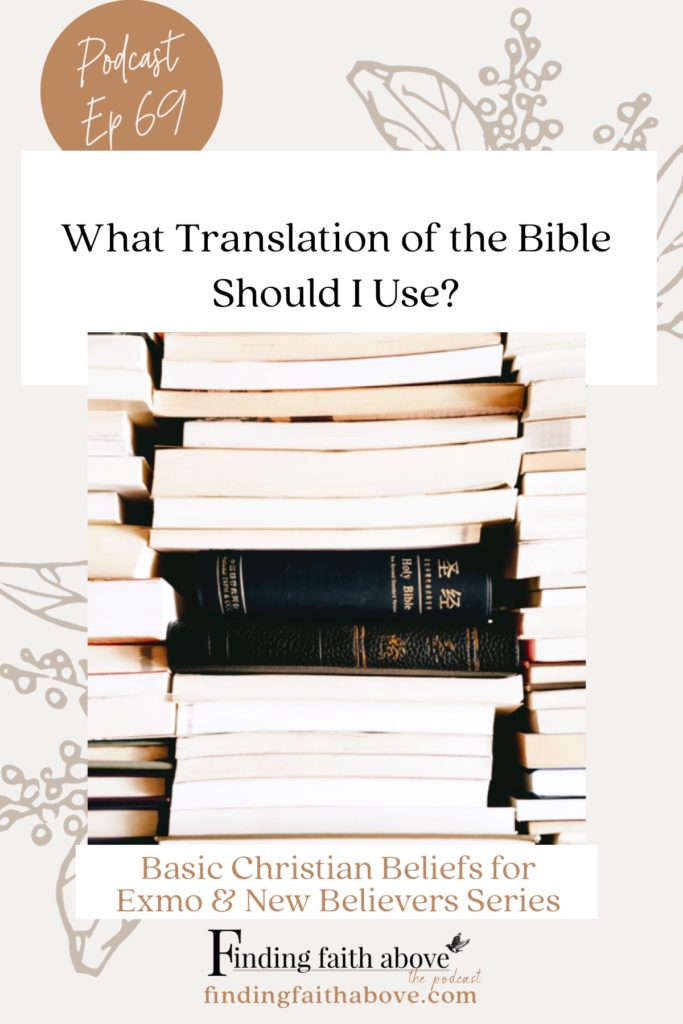
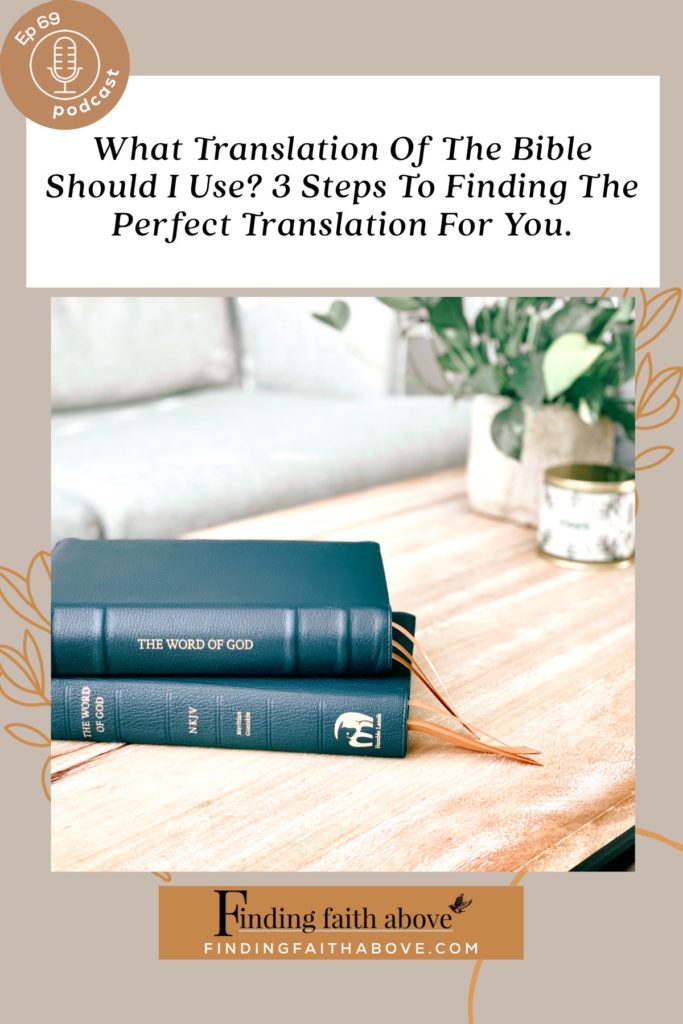
** Note: For every ounce of textural, archeological, social, anthropological, and what seems to be irrefutable evidence in one direction there is a pound in the other by someone who holds a different opinion. If you want to find someone who believes strongly in support of something very opposite of what is written here, you can probably find it. This is where my research and experience have landed me.
Resources used in this article:
A Case for Christ, Revised & Updated, by Lee Strobel
Another Gospel?, by Alisa Childers
Making of the Bible [Extended Version] Tim Mackie (The Bible Project)- https://youtu.be/eaqKzYJ151Y
The God Who Speaks (2018) | Full Movie | Alistair Begg | Darrell Bock | D.A. Carson- https://youtu.be/MmJrRx663hgWebsite
Can We Trust the Bible? https://radical.net/article/can-we-trust-the-bible/
10 Reason you Can Trust the Bible- https://www.eternitynews.com.au/good-news/10-reasons-you-can-trust-the-bible/
…And countless hours in other podcasts, websites, articles, books, sermons, and lectures.





